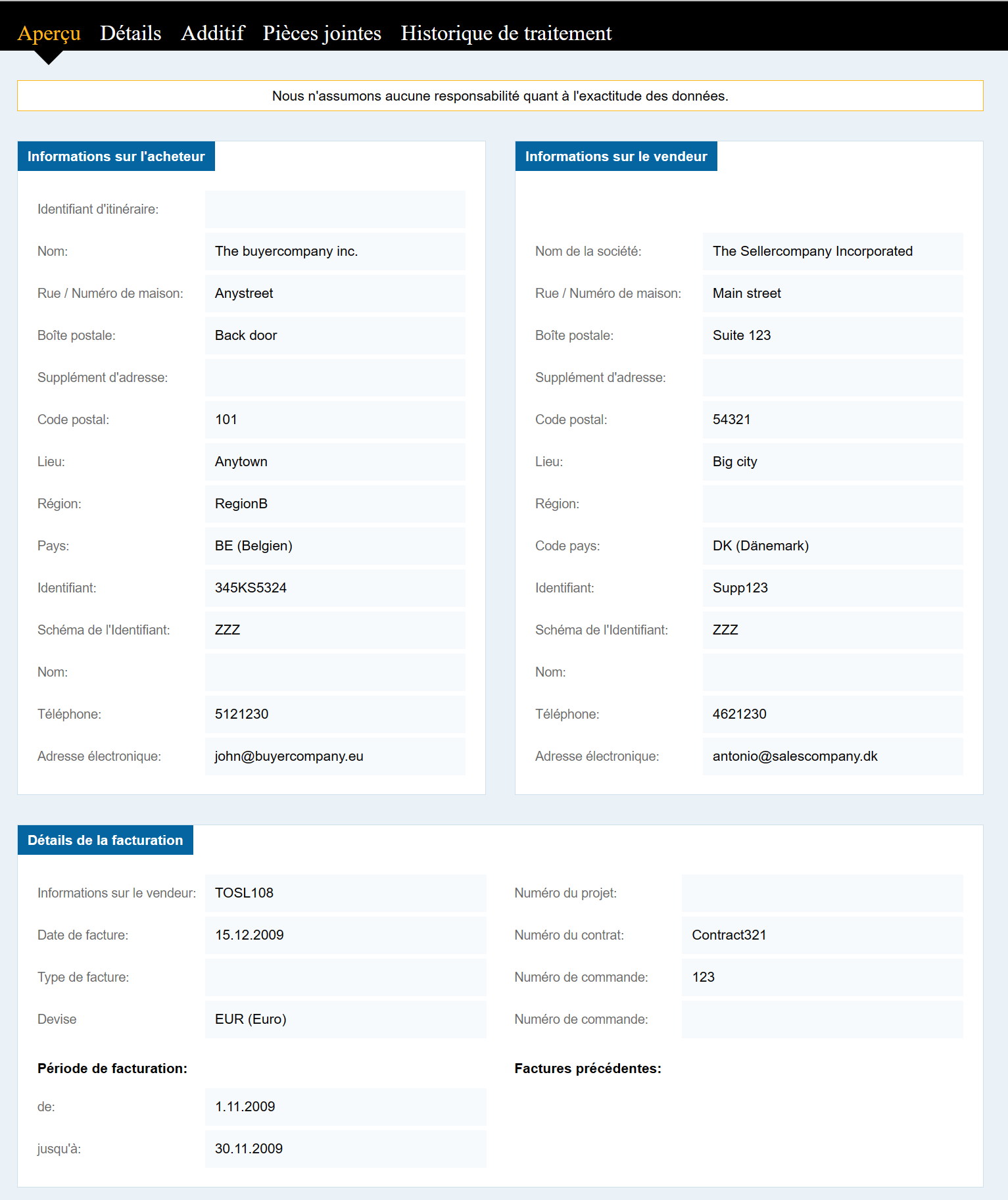Mustang 2.7.3 was released today, 2023-06-16 and adds three attributes in the parser to the invoice class (Issue 328, SpecifiedTradeProduct/SellerAssignedID, SellerOrderReferencedDocument/ram:IssuerAssignedID and BuyerOrderReferencedDocument/ram:IssuerAssignedID)
Author: admin
Mustangserver 0.8.2
Mustangserver 0.8.2 was released on 2023-06-10, which upgraded internally to Mustang 2.7.2 and parses invoices better.
Mustangserver provides technology-independent network access to the functionality of the open-source e-invoicing solution Mustang, which focusses on functionality for Factur-X/ZUGFeRD, Order-X and XRechnung.
Mustang 2.7.2
Version 2.7.2 of the open-source Java e-procurement library Mustangproject now also understands BasisQuantity in the import and in classes and not only in it’s interface and allows programmatic access also on validation results and not only on the final validation XML-report.
Mustang 2.7.1
Released on 2023-05-25, version 2.7.1 of the open-source Java and .net e-procurement library and tool Mustangproject fixes #317 (support conversion towards peppol #282), #313 Update CII2UBL library, #315 invoiceimporter constructor for InputStream and is now capable of extracting data into existing invoice objects
Mustangserver 0.8.1
On Saturday, May 6th, along with the successful completion of our server maintenance we released a new version of Mustangserver, 0.8.1, which allows you to choose the PDF/A-Version of the PDF->PDF/A-conversion:
When we tested that feature in cooperation with a customer we sometime saw significantly smaller output file sizes when exported to PDF/A-3 instead of PDF/A-1, in one particular case even a reduction of 87%.
Additionally we improved logging, e.g. with a default logging config #29. And Mustangservers upgrade to Mustang 2.7.0 allowed the validation and creation of XRechnung 2.3, which will become mandatory as of August 2023. The
reading(=parsing) of XR 2.3 is backward compatible anyway.
We recently conducted a small survey which features you would like to see in Mustangserver.
The most requested feature was the ability to visualize (i.e. convert into HTML).
This has now been prepared by feeding our know-how we gained with Quba back into
Mustang 2.7.0.
Apart from being able to create HTML from UBL input (invoice and credit memo) this
includes french and english tranlations and the codelist attribute lookup, i.e.
instead of 15 “H87″s of an item you will see 15 “Piece(H87)” of that item.
Also prepared in Mustangproject was the ability to extract data into
existing invoice objects, which may air in 2.7.1 and allow Mustangserver to
extend the Invoice object currently returned in it’s parse method.
At least the visualization, maybe even the subclass feature will be used in the next Mustangserver version.

Discussion proposal mandatory german B2B-e-invoices as of 2025
In a workshop on 2023-04-20./21 it was briefly mentioned, that Germany had requested permission to introduce mandatory domestic B2B-e-invoicing already in November 2022 and a “discussion proposal” mentions 2025-01-01 as possible date. One of the main purposes of the workshop was to kick off the development of Deliver-X, a hybrid delivery advice briding the gap between Order-X and Factur-X.

Mustang 2.7.0
In todays (2023-04-17) release of version 2.7.0, Mustang has learned from our invoice viewer Quba and can now
– convert Factur-X/XRechnung CII XML to HTML with different output languages (english and french is now possible, previously its was only german)
– this now also works with UBL XML input (invoice, credit memo)
– it also revolves codelists, instead of e.g. type “380” you will see “380 (commercial invoice)”
Mustang 2.6.2 “Happy Easter”
In todays (2023-04-06) “Happy Easter” release of Mustang 2.6.2 it is now also possible to build the software on Linux: it was always running and embeddable in Linux (as it is on Windows and Mac) but it now also builds there, if required. Which also fixes it’s Github action, which performs automatic tests on pull requests.
The B2G (read: EN16931) validation was improved by upgrading the CEN schematron to v1.3.9 and Mustang can now read, write and validate XRechnung 2.3 (mandatory in Germany as of August). Additionally there was also a small correction for B2G in France by being able to define when VAT collection becomes applicable (issue #309).
As always, the command line version of Mustang can be downloaded from this website.
Mustangserver planned maintenance February
On Saturday, February 26 we performed the scheduled February maintenance on our Mustangserver REST API which included the following:
- We moved the VM to a physically different (newer, bigger) server in a different data centre of the same provider, of course remaining in Germany. You should not even notice the change, although you may notice api.usegroup.de and gw.usegroup.de resolve to a new IP address.
- There is now a manual for Mustangserver 0.8.0, adding the brief description how to write Order-X files
We now use the host system firewall, which should give us more security
additionally, in the past weeks
- we renewed our SSL server certificate
- Quba’s validation feature was unfixed from 0.7.0 and now always uses the most up to date version
- we shut down Mustangserver versions prior to 0.8.0
- we performed a usability test on the Mustangproject homepage, had the obligatory data protection awareness training for our employees and we
- further improved monitoring: apart from monitoring our infrastructure (i.e. network, system, and the API server) we now also monitor the Mustangserver process
We will most likely do some un-down-timish updates in the meantime, e.g. Mustangserver 0.8.1 will be released in the near future and support to convert from plain PDF to PDF/A-3. It will be an additional parameter which will be backward compatible. PDF/A-3 files can be surprisingly smaller than PDF/A-1 ones.
If all goes well there will be no scheduled maintenance neccessary for March or April. Unless otherwise communicated the next scheduled maintenance with a small downtime will take place on Saturday, May 6th, 2023, again from 15:00-16:00 CET. The reason is yet another SSL certificate update which requires us to restart the API management process.
Mustang 2.6.1
Today, February 13th, 2023 we released Mustang 2.6.1 with the following
New Features
- allow prepaid amount in invoice class
- allow Bank credentials without BIC
Corrections for small profiles
- allow minimum profile without delivery date
“Systemic corrections”
- return error code not only on validation but also on recursive directory validation
- toolchain.xml now only required on `mvn release:release` not already on `mvn package`
- upgraded dependencies jackson-databind from 2.13.4.1 to 2.14.2 and xmlunit-assertj from 2.9.0 to 2.9.1